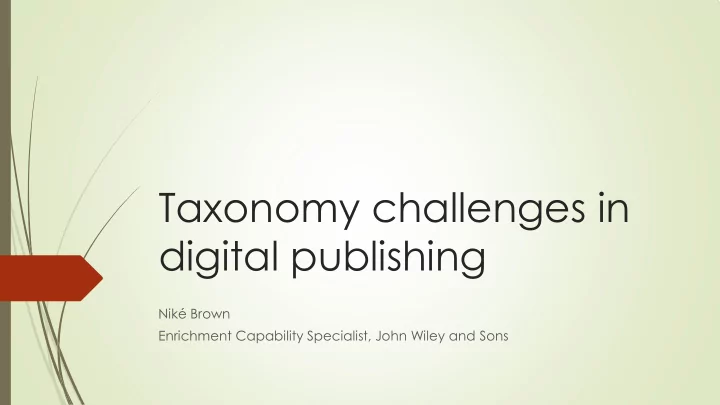

Taxonomy challenges in digital publishing Niké Brown Enrichment Capability Specialist, John Wiley and Sons
My background… Honours degree in Information Management and Publishing Temp to permanent role at Croner Publications Ltd after graduation Product development role for first content published on CD-ROM Moved on to content management and thesaurus management roles Manager of the Croner-I content platform Spent three years as Content Architect leading a team of developers and content specialists
Wolters Kluwer UK and Wiley Wolters Kluwer are a global publishing company Reference publisher in finance, business and compliance, and healthcare Croner and CCH publishing houses formed WK UK through acquisition Wiley are a global academic publishing company Academic journal and scholarly research publisher
WK content online First attempt at creating an online-only product – disastrous… Croner-i: content created for online-only publishing – ahead of its time ‘Smart’ content XML Thesaurus for classification metadata Un-siloed content in contrast to books, etc Comparison with major competitor ‘Books on screen’ – right down to the emulation of a ‘page’ flipping over
CHALLENGE #1: metadata and silos Pros of un-siloed metadata Reuse of content Flexibility for content configuration and online product development Relating content previously buried Maximising content assets Enhanced user / customer experience New revenue stream with multiple options to grow Cons of getting to un-siloed metadata Cost Effort Resistance to change – new ways of working
Croner-I: metadata generated related content
Croner-I: metadata generated related content
By contrast…
Wiley content online All journals and most reference works are on the Wiley Online Library Societies are entitled to have a Hub built by Wiley for their content, if they wish Benefits of the Hub include enrichment Content is ‘enriched’ with either an existing taxonomy, or a custom-built taxonomy
A Hub….
Different taxonomic approaches Wiley Wolters Kluwer One (beautifully formed) Almost 200 taxonomies thesaurus covering eight main Currently, little reuse among market areas content domains Active use of related terms Audit of domains required Embedded as part of the Content Not part of the Content Pipeline Pipeline (yet) Product builds would fail if Taxonomies come in many and content was not classified various forms…
CHALLENGE #2: can you have too many taxonomies? One taxonomy or many? Croner went for one to cover all domains Wiley have many Software used Concept schemes – can different projects or taxonomies be linked? How are concept schemes treated? Wiley’s software treats concept schemes quite differently from Croner’s, which was different again from the original thesaurus management software used Influences how you approach the formation of your thesaurus
CHALLENGE #3: understanding and expectations Internal resistance New ways of working often required ”It’s not broken, why fix it?” “Why can’t X do it – I’m too busy” Working with SMEs Often have a mixed understanding of what’s required from them The kitchen sink HAS to be included! Anxiety that something essential won’t get covered Business expectations and views of enrichment “It’s just a mechanical tool, isn’t it?” “What’s my ROI?” “What do you mean, it might never be finished??!”
Reactive or proactive? To quote Henry Ford: “If I’d asked people what they wanted, they’d have said, ‘A faster horse!’” It’s not always easy for non-taxonomists to see the benefit of content classification Have to accept that some people will never see the point in taxonomies Great advantage in doing the work before the business realises it needs it Look for opportunities to enrich content and display the power of metadata More persuasive than discussions, etc
Future challenges Embed taxonomy application into the content pipeline Promote understanding and enthusiasm for taxonomic classification Explore machine learning to build taxonomies Content mining and entity extraction Expansion of taxonomy features on front end Development of ontologies
A quote from Patrick Lambe… “At the end of the day, most of our categorisation decisions are pragmatic ones, which is why so many information scientists need to forget a lot of their training if they are to design knowledge taxonomies that work in practice.” Organising Knowledge: Taxonomies, Knowledge and Organisational Effectiveness Patrick Lambe, 2007
Thanks for listening! Questions?
Recommend
More recommend